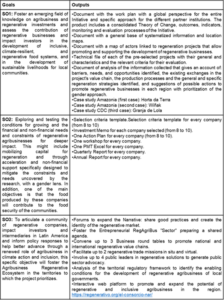Based on literature review, in 2020, we prepared a Research Protocol on regenerative business models, first characterizing the organization, and including information about the business’ context (with a special focus on place), as well as information about the value proposition, value delivery and value capture. We also established several themes to guide data collection: How to define regenerative value? What value is offered through the regenerative business model? How is regenerative value created through the business model? What is the role of synchronicity? What are the placed-based tensions? What are the behavioral attributes of leadership for regeneration? And How does the regenerative model affect governance? We also included some other specific topics, related to some of the members’ interests: supply chain management, institutional change, regenerative investments and gender perspectives.
Between 2021 and 2023, we identified 18 cases (see table 1) and we collected data from 13 of them, preparing an analytical case of each based on the research protocol.
Table 1: Sample of the project
| Name | Country | Industry |
|---|---|---|
| Cacauway | Brazil | Food Industry |
| Rizoma | Brazil | Food Industry |
| Cultiva | Chile | Forestry |
| Techos y muros verdes | Colombia | Green roofs |
| La Hilda | Costa Rica | Food Industry |
| Tippy Tea | Ecuador | Food Industry |
| Familia Torres | Spain | Wine Industry |
| Organic Cotton Colours | Spain, Brazil | Fashion Industry |
| Ejido Verde | México | Forestry |
| Las Cañadas | México | Food Industry |
| Futuro Forestal | Panamá | Forestry |
| Guayakí | Paraguay, Brazil, Argentina | Soft drinks Industry |
| Gocta Natural / La Calera | Perú | Agricultural Supplies |
Based on these data we have the following outputs:
- We have published one teaching case in Harvard Business Publishing: Familia Torres: From Sustainability to Regenerative Agriculture. Few more teaching cases are in the pipeline for publication in HBP (La Hilda and Las Cañadas).
- We are preparing a book analyzing regenerative business models in different economic sectors (forestry, urbanism, agriculture, bioeconomy) and the process of transition towards regenerative business models:
- Layrisse, F. & Beckmann, M. In a forest, no two trees are alike: different approaches to regenerative forestry business models
- Gutierrez, R. Regenerative models in urban settings: Potential and limitations of returning nature to our cities
- Trujillo, D., Layrisse, F., Blugerman, L., Sanchez, J. Regenerative Agribusiness Models
- Comini, G., Rodrigues, J., Fischer, R.M. Bioeconomy and Regenerative Businesses in Amazon: towards an active commitment to the entrepreneurship of the standing forest
- Penanno, C. Ancestral practices
- Gonzalez, R.A. Economic value in the organizational value logics of regenerative business models
- Blugerman, L. & Berger, G. Comparative regeneration
- Vernis, A., Devenin, V., & Casadiego, J. Transitioning to regenerative sustainability: The case of Familia Torres
- We submitted 5 short papers to EGOS Conference:
- Blugerman, L. & Berger, G. From sustainability to regeneration in the food and beverages industry in Iberoamerica.
- Larysse, F., Reficco, E, & Devenin, V. Maximizing wellbeing: developing apost-growth business model
- Pennano, C. Back to basics: Re-learning ancestral systems for regeneration. Why listening to indigenous traditional ecological knowledge is an effective approach to the environmental crisis.
- Rodríguez, J. Toward a process model to support agroecological enterprises in rural communities.
- Vernis, A., Devenin, V, & Casadiego, J. From the terroir to the table: business model transformation in adopting regenerative sustainability.
Research and impact projects: NAR Consortium
Participant institutions: IDRC, AVINA, CATIE, GRADE, Landivar University, SVX, Sistema B, NEST, SEKN.
Project goal:
This initiative centers on fostering knowledge and action within the agricultural sector, specifically targeting the Amazon and Central America, recognized as climate hotspots. Its primary goal is to empower regenerative companies and investors, enabling them to amplify their influence. By doing so, the initiative aims to bolster inclusive and resilient food systems, providing solutions to challenges like climate change and the impacts of the COVID-19 pandemic.
In pursuit of its goals, the initiative outlines three specific objectives. The first objective focuses on knowledge management concerning regenerative companies within the specified biomes, with a particular emphasis on elucidating the roles and situations of women in this sector. The second objective investigates regenerative organizing approaches from a distinct business ecosystem perspective, shedding light on both financial and non-financial drivers and barriers. The third objective aims to identify the needs and opportunities for regenerative business initiatives, as well as exploring the role of third parties in fostering and coordinating community dynamics among various stakeholders. The project timeline spans from 2022 to 2024, and for more detailed information about specific objective goals and outputs, please refer to Table 2.
Table 2: Specific objectives/ Goals and outcomes
